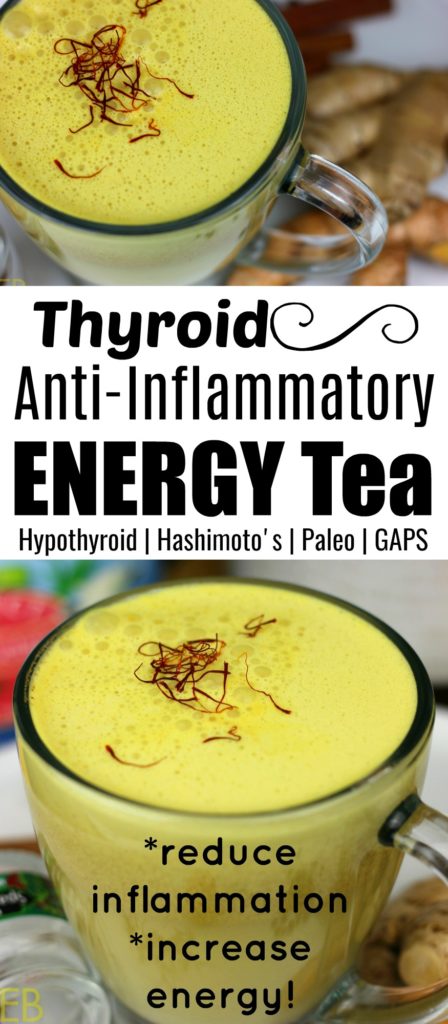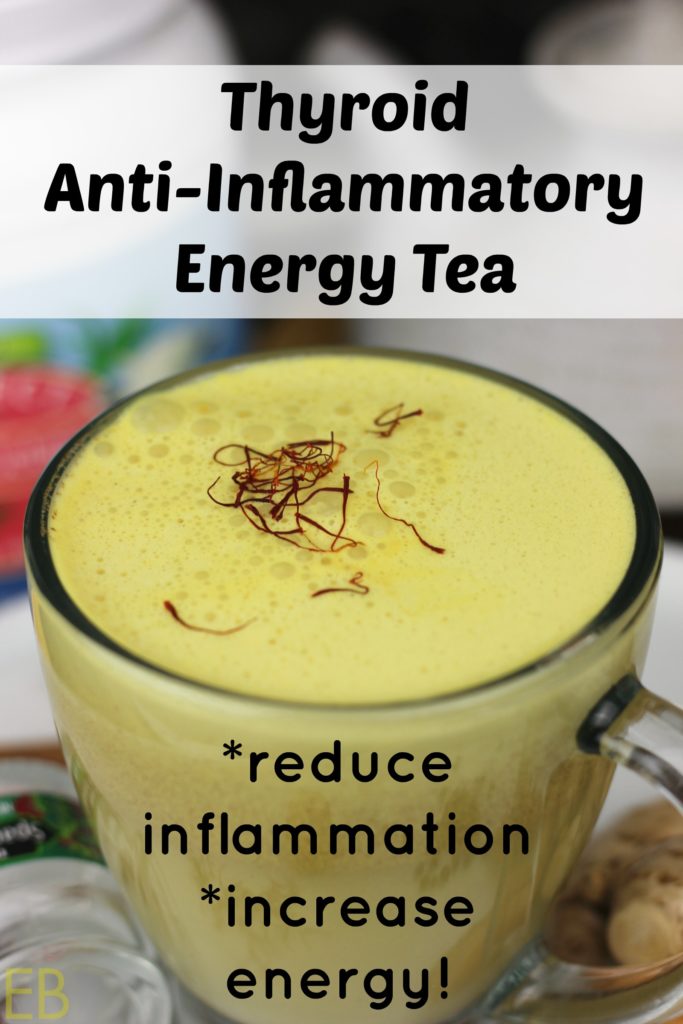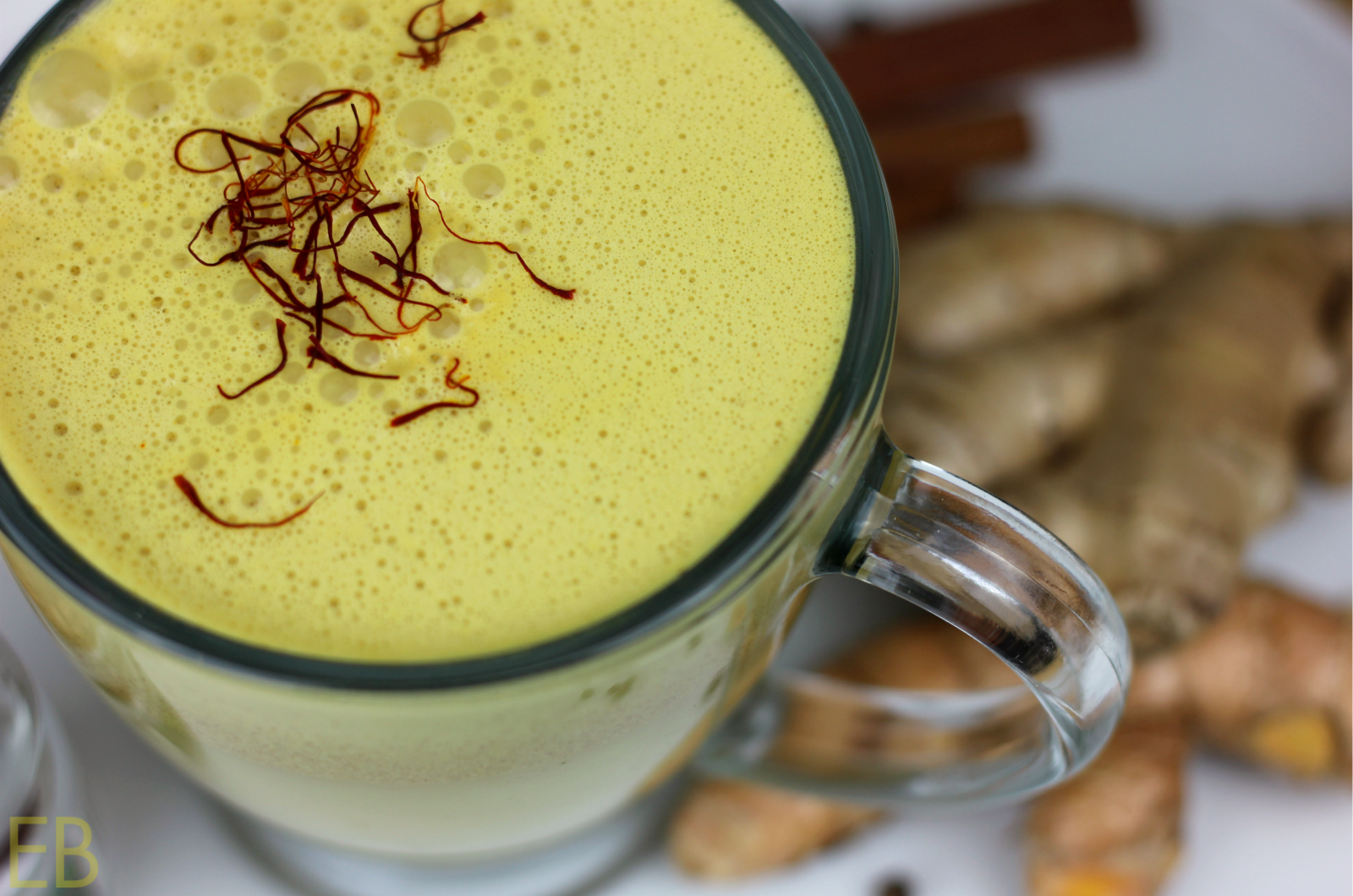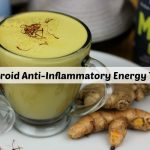I may receive a commission if you purchase through links in this post. I am not a doctor; please consult your practitioner before changing your supplement or healthcare regimen.
Thyroid Anti-Inflammatory Energy Tea is like a rich, healthful golden milk steamer, with the benefits of energy and immune boosting herbs and anti-inflammatory ingredients — that just happen to taste great.
This tea is appropriate for most people and diets, but specifically is great for gluten-free, AIP, GAPS and even Keto.
Tea for the thyroid
When we talk about supporting the thyroid, every body is different. Autoimmune conditions like Hashimoto’s are complex. While different approaches are required for each person, there are some general principles that will benefit the thyroid and immune system of most people.
Reducing inflammation is one of these principles. This Thyroid Anti-Inflammatory Energy Tea may help!
Removing triggers is another key principle.
And the third is enhancing T cell function, (which I’ve mentioned in regard to ingesting more resistant starches or prebiotics).
Certain probiotics help the T cells know where to go and what to do in terms of supporting the thyroid’s functions: Saccharomyces Boulardii and Just Thrive are two great choices. (*Enter code BEAUTIFUL10 at check out for 10% off this probiotic.)
Each of the three above principles is a post in and of itself. Today we’re just going to focus on this tea recipe, and what each of the ingredients provides. Their goal is to reduce inflammation and to provide energy for those of us who need it!
Thyroid Anti-inflammatory Energy Tea Ingredients
Ginger in Thyroid Anti-inflammatory Energy Tea
Ginger is a wonderful all-round herb. It boosts the immune system, has anti-inflammatory properties and increases circulation. It also soothes the gastro-intestinal tract and aids in digestion. (source 1, 2, 3) Herbalist Lalitha Thomas tells us ginger cleanses the lymphatic system, an important step in our body’s detoxification process.
Blended with the MCT oil that I mention below, this beverage is both exciting and calming, creamy and spicy, nourishing and delicious to drink!
Essential Fatty Acids in Thyroid Anti-inflammatory Energy Tea
Essential fatty acids help to reduce inflammation. We add MCT oil to this tea recipe because it yields big energy! I love this ingredient and a few years ago started using it daily for my family.
MCTs are medium-chain triglycerides — a unique kind of saturated fat often missing from our diets. MCTs are easy to digest and are never stored as fat! They’re sent by our bodies straight to the liver where they’re converted into energy — both brain and body energy.
MCTs also increase the metabolism and help to reduce weight gain that’s often associated with thyroid issues. MCTs are excellent news for those who don’t have a gall bladder, because they don’t require bile for digestion.
When blended into this tea recipe, MCT oil creates the “bulletproof” texture: creamy and light, yet rich.
Cinnamon and cordyceps in Thyroid Anti-inflammatory Energy Tea
The hypothalamus and pituitary glands, which are located in the brain, control and regulate the secretions of the thyroid and other glands. According to Eastern medicine, this complex network can be disturbed and lead to endocrine diseases like hypothyroidism. Herbs can be used to activate this network.
Cinnamon helps to regulate this process, promoting improved digestion, energy and metabolism. (While I used to buy Cassia, as it’s considered powerful in this respect, I now choose Ceylon (find it here) because Cassia has implicit dangers [high levels of coumarins which are toxic to the liver].)
Cordyceps
UPDATE: Cordyceps is something I’ve started adding to this drink more recently. It was recommended by my doctor to restore my energy on a deep level. It’s considered in Chinese medicine to activate the HPA axis and promote this network’s health. I can definitely feel the difference when I take this medicinal mushroom (find cordyceps here) and recommend it based on my personal experience. (source)
Turmeric in Thyroid Anti-inflammatory Energy Tea
Most folks approach turmeric as if it were medicinal chocolate: When the urge strikes, eat it, and consequently feel good about what you’re doing for your body. The problem with this thinking is that turmeric does not work that way. Chris Kresser explains that, “the curcuminoids in turmeric are not very well absorbed.” (source)
I’ve written at greater length about turmeric here. But the gist of it is this: Very small amounts of turmeric on a regular basis may have an effect on inflammation. That’s why many in India see the benefit. There’s just a little turmeric in most of their foods. But the best research shows it to be ineffective for inflammation in large amounts or with irregular consumption.
I therefore consider it an optional ingredient in this tea. If you’re going to drink the tea regularly, and also put a teeny bit of turmeric in lots of your other foods, then it may have a benefit.
About Curcumin
Curcumin supplements like this one, with the right co-factors, are more reliable for those who don’t consume turmeric often.
Quoted from my article on the topic,
…scientists discovered that curcumin is perhaps not an antioxidant as was once believed. Instead, they now understand that curcumin is actually an irritant, or a pro-oxidant. Curcumin’s mild toxicity actually engages the body’s natural defenses. This result is called hormetic. Turmeric’s healing ability throughout history may indeed have been due to the hormetic reaction. Just as small doses of curcumin in clinical trials are often more potent than large doses, the concept of hormesis is one of low dose stimulation. So eating a bit of turmeric, in curry, for instance, could have good health benefits. This does not mean that it reduces inflammation. Taking large amounts of turmeric or curcumin also has not shown itself to be beneficial. However, bioavailable curcumin can indeed deliver this desired effect (source).” (source)
Of course turmeric is beautiful — a key ingredient in Golden Milk. It’s part of what gives the tea its exotic visual appeal. I like the flavor, too. However, notice that I do not add a lot. Just a little. And then a little in lots of cooking additionally is how to derive the benefit.

Saffron in Thyroid Anti-inflammatory Energy Tea
If you leave the turmeric out, a beautiful alternative for Golden Milks is to use saffron threads. They’re even more exotic, being the filaments from the crocus flower, native to the Middle East. I love using these delicate strands. Saffron is indeed medicinal and creates a similarly colored steamer. Saffron improves circulation and balances hormones. This alternative is given below in the recipe.
Gelatin in Thyroid Anti-inflammatory Energy Tea
I always add gelatin to my blended hot beverages. It makes a very fine foam, like the head of a cappuccino.
Sustainably-sourced gelatin, like this one, also helps to heal the gut, feeding the cells that line the gut lining with glutamine; and because it contains glycine, it helps the body to detoxify. Gelatin can help to reduce inflammation, stimulate the immune system and regulate hormones. (Enter code BEAUTIFUL10 at checkout for 10% off this sustainably-sourced gelatin.)
Butter in Thyroid Anti-inflammatory Energy Tea
Butter is optional, if you don’t do well with dairy. You can always use coconut oil in its place. But I love butter. It contains K2, which is a co-factor for vitamin D3; and, as you may know, D is one of those vitamins those of us with thyroid issues need. Butter helps vitamin D to assimilate.
Other essential ingredients for thyroid health are vitamins E and the mineral selenium. Butter is a great source for all of these nutrients! And butter contains vitamin D too. Butter also contains easy to assimilate iodine. (source)
Alternatives to butter
Butter adds to the creamy nature of this tea, making it oh-so delicious. But, like I said, coconut oil will do that too. If you can have butter, enjoy this lovely addition, and know how good it is for you. It does need to be pasture-raised, like this.
Ghee (or this Yak Ghee for A2!) is another great option — if lactose intolerant or sensitive to casein. Ghee also contains MCTs! (source)
Black Pepper in Thyroid Anti-inflammatory Energy Tea
A compound in black pepper, piperine, helps to make turmeric’s anti-inflammatory properties effective. But even without turmeric, black pepper stands on its own for its nutritional benefits.
Black pepper aids in digestion, increasing the stomach’s production of hydrochloric acid. Pepper helps the body to detoxify by dispersing mucous — and contains vitamins C and D. It improves the body’s immune system by neutralizing free radicals with its high antioxidant content. (source) Black pepper also aids the body in weight loss and nutrient absorption. (source)
Omit black pepper from this recipe if you’re on the AIP diet.
Licorice
I give licorice as an ingredient below, in my Thyroid Anti-inflammatory Energy Tea recipe, as an optional ingredient. Licorice is wonderfully supporting to the endocrine system, but I know not everyone is a fan of the flavor; so it’s optional. Licorice root has antioxidants that help to protect the thyroid from oxidative damage. It detoxifies and balances hormones. (source and source)
Cautionary words on licorice: While licorice is gentle and beneficial for most people, licorice can lead to high blood pressure and/or low potassium levels in some patients. Licorice is a good supplement to ask your doctor about before using. (source)
Conclusion
This post is not exhaustive. There are many other supplements and herbs that help to support the thyroid. Here’s A Comprehensive Guide to Thyroid Supplements Part 1 and Part 2.
I absolutely love the flavor of this tea. It’s super creamy, calming and lovely. As much as I like great, homemade, nourishing, bulletproof hot chocolate, this super healthful tea actually rivals it for me, as far as the pleasure it provides. The fact that it’s so nourishing for my body also makes me feel great about what I’m drinking.

Thyroid Anti-inflammatory Energy Tea
Ingredients
- 12 ounces water filtered
- 1 Tablespoon MCT Oil see link below
- 1 Tablespoon butter pastured; or ghee or coconut oil (Use coconut oil for AIP.)
- 1 Tablespoon gelatin sustainably-sourced, see link below
- 1 inch nub fresh ginger , cut into several pieces (washed but unpeeled)
- ½ teaspoon cinnamon ground
- ⅛ teaspoon turmeric ground, or use saffron 15 threads (which are lovely and balance hormones; see link below)
- ⅛ teaspoon black pepper about 15 grinds of freshly ground black pepper (optional for AIP)
- sweetener: stevia, to taste, for Keto OR 2 teaspoons raw honey or pure maple syrup for Paleo, AIP and GAPS
- 1/4-½ teaspoon bulk cordyceps powder optional
Instructions
- Heat water in small saucepan while you measure ingredients into blender.
- Measure in: MCT oil, butter, ginger, sweetener, cinnamon, turmeric or saffron, and black pepper.
- When water is hot but not yet boiling, turn off heat and add to blender. Add gelatin.
- Use caution when blending hot liquids. Blend on medium-high speed for 45 seconds, (to fully liquify fresh ginger).
- Serve. Relax while you drink it.
Notes
Additional Optional Add-in
There's an herbal tincture I also like to add: licorice. It can be added to the blender before blending or stirred into the hot cup of tea after serving. But use caution or avoid if you have hypertension. Licorice is not only an anti-inflammatory and excellent for the endocrine system (the body's system of hormones and glands), it also aids in digestion.Nutrition

What “thyroid-boosting” herbs and supplements NOT to take
Chris Kresser explains that cases of Hashimoto’s and other thyroid-related conditions are quite individual. We can’t assume that all herbs that affect the thyroid will be beneficial. Examples of foods to avoid without further guidance from a practitioner who understands immunology include green tea, Gotu Kola, echinacea and astragalus. (source)
I’d love to hear from you! Have you made this tea? What are your favorite herbs for thyroid health?
Related articles you may like:


Renee Kohley says
I’m going to make this tomorrow afternoon! Thank you!
Megan Stevens says
Wonderful! Hope you love it!
Carol @studiobotanica says
Sounds delish. Just a note: Licorice is a valuable herbal helper but needs a caution for anyone with hypertension. Looks SO yummy too!
Megan Stevens says
Thank you, Carol!
Tera Rose says
I have heard that and forgot, thanks for the reminder, my BP sometimes goes up so maybe I will just avoid it, at least until I get things back to normal.
linda spiker says
That is one health promoting drink! So much good stuff in one recipe!
Megan Stevens says
Seriously. 😉 The creamy quality, the ginger and the saffron are my favorite components. They stay with me, happy-making!
Marjorieann1977 says
I love all of the ingredients used in this recipe. Yum!!
Megan Stevens says
Thanks, Marjorie!
Emily @ Recipes to Nourish says
Such a beautiful warming drink with the most special ingredients. I would love to have this to sip on right now. Coziness in every sip.
Megan Stevens says
Me too! I’m away from the house as I type, and I love the thought of going home to this! Thank you!
Kelsey Steffen says
I’m not normally a licorice fan, but in this recipe it sounds like it would pair really well with all those flavors! Spicy, yet sweet…sounds SO GOOD!
Megan Stevens says
Same here! I can do licorice, but I don’t LOVE it. Yet here, it works well and the other components balance it well. Plus I know how balancing it is for me. Thanks!
thefoodhunter says
I love the flavors in here.
Megan Stevens says
Oh I’m so glad! Thanks for sharing! 🙂
Tera Rose says
I have thyroid AND gallbladder issues! My gallbladder is being removed Monday morning and despite all the nay sayers I am quite happy about it. I have been thinking about the gelatin for a while now, thanks for the recommendation, I just ordered some 🙂 I am slowly getting my body back to health, this gallbladder attack was a wake up call that I let things slip! I am excited to try this recipe because I have never thought to use licorice or gelatin! I love the traditional tea everyone makes so this should be even better.
Megan Stevens says
Hi Tera, the other benefit is that MCT oil is a fat that’s easy to digest for those without a gall bladder! I’m not sure if I included that fact above in the post. 🙂
Barbara Coon says
I can’t wait to get into the GAPS healing diet far enough to try this! What would you think of making licorice tea as the “base?”
Megan Stevens says
Hi Barbara, sorry to get your question late! I think it’s a lovely idea!
Heather says
In step #2, when you say measure in, do you mean measure in to the blender or into the heating water?
Megan Stevens says
Hi Heather, yes, measure into the blender.
Mona Kaniak says
How much licorice tincture do you add?
Megan Stevens says
Hi Mona, you can follow the dosage on HerbPharm’s tincture bottle. I believe it’s one dropper full. 🙂
Mona Kaniak says
Thanks! I made it using cold homemade kefir instead of hot water… mmm good! It’s a keeper!
Megan says
Wow, such a cool and lovely variation. If you let the kefir sit overnight with all these herbs, the fermentation will further enhance their properties too! 🙂
Monica Hughes says
Can you blend everything together first and then heat it up?
Megan says
Hi Monica, the butter and gelatin do better if the tea is warm before you blend.